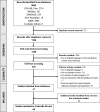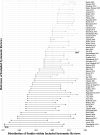Equity in prenatal healthcare services globally: an umbrella review
- PMID: 38468220
- PMCID: PMC10926563
- DOI: 10.1186/s12884-024-06388-0
Equity in prenatal healthcare services globally: an umbrella review
Abstract
Background: Timely, appropriate, and equitable access to quality healthcare during pregnancy is proven to contribute to better health outcomes of birthing individuals and infants following birth. Equity is conceptualized as the absence of differences in healthcare access and quality among population groups. Healthcare policies are guides for front-line practices, and despite merits of contemporary policies striving to foster equitable healthcare, inequities persist. The purpose of this umbrella review is to identify prenatal healthcare practices, summarize how equities/inequities are reported in relation to patient experiences or health outcomes when accessing or using services, and collate equity reporting characteristics.
Methods: For this umbrella review, six electronic databases were searched (Medline, EMBASE, APA PsychInfo, CINAHL, International Bibliography of the Social Sciences, and Cochrane Library). Included studies were extracted for publication and study characteristics, equity reporting, primary outcomes (prenatal care influenced by equity/inequity) and secondary outcomes (infant health influenced by equity/inequity during pregnancy). Data was analyzed deductively using the PROGRESS-Plus equity framework and by summative content analysis for equity reporting characteristics. The included articles were assessed for quality using the Risk of Bias Assessment Tool for Systematic Reviews.
Results: The search identified 8065 articles and 236 underwent full-text screening. Of the 236, 68 systematic reviews were included with first authors representing 20 different countries. The population focus of included studies ranged across prenatal only (n = 14), perinatal (n = 25), maternal (n = 2), maternal and child (n = 19), and a general population (n = 8). Barriers to equity in prenatal care included travel and financial burden, culturally insensitive practices that deterred care engagement and continuity, and discriminatory behaviour that reduced care access and satisfaction. Facilitators to achieve equity included innovations such as community health workers, home visitation programs, conditional cash transfer programs, virtual care, and cross-cultural training, to enhance patient experiences and increase their access to, and use of health services. There was overlap across PROGRESS-Plus factors.
Conclusions: This umbrella review collated inequities present in prenatal healthcare services, globally. Further, this synthesis contributes to future solution and action-oriented research and practice by assembling evidence-informed opportunities, innovations, and approaches that may foster equitable prenatal health services to all members of diverse communities.
Keywords: Antenatal; Health equity; Health services; Inequity; PROGRESS-plus; Pregnancy; Prenatal; Review of reviews; Umbrella review.
© 2024. The Author(s).
Conflict of interest statement
The authors declare no competing interests.
Figures



Similar articles
-
Beyond the black stump: rapid reviews of health research issues affecting regional, rural and remote Australia.Med J Aust. 2020 Dec;213 Suppl 11:S3-S32.e1. doi: 10.5694/mja2.50881. Med J Aust. 2020. PMID: 33314144
-
The future of Cochrane Neonatal.Early Hum Dev. 2020 Nov;150:105191. doi: 10.1016/j.earlhumdev.2020.105191. Epub 2020 Sep 12. Early Hum Dev. 2020. PMID: 33036834
-
Conceptual framework on barriers and facilitators to implementing perinatal mental health care and treatment for women: the MATRIx evidence synthesis.Health Soc Care Deliv Res. 2024 Jan;12(2):1-187. doi: 10.3310/KQFE0107. Health Soc Care Deliv Res. 2024. PMID: 38317290
-
Antenatal interventions for preventing stillbirth, fetal loss and perinatal death: an overview of Cochrane systematic reviews.Cochrane Database Syst Rev. 2020 Dec 18;12(12):CD009599. doi: 10.1002/14651858.CD009599.pub2. Cochrane Database Syst Rev. 2020. PMID: 33336827 Free PMC article.
-
Student and educator experiences of maternal-child simulation-based learning: a systematic review of qualitative evidence protocol.JBI Database System Rev Implement Rep. 2015 Jan;13(1):14-26. doi: 10.11124/jbisrir-2015-1694. JBI Database System Rev Implement Rep. 2015. PMID: 26447004
Cited by
-
Scoping review: the current landscape of NIPT in South Africa.J Community Genet. 2025 Jun;16(3):227-241. doi: 10.1007/s12687-025-00802-6. Epub 2025 May 28. J Community Genet. 2025. PMID: 40437261 Free PMC article. Review.
-
Prenatal tests in Brazil: prevalence and associated factors according to the Brazilian National Health Survey.Rev Esc Enferm USP. 2025 Jan 27;58:e20240154. doi: 10.1590/1980-220X-REEUSP-2024-0154en. eCollection 2025. Rev Esc Enferm USP. 2025. PMID: 39869759 Free PMC article.
-
Drivers of care and outcomes for people facing fetal conditions in the United States: a conceptual framework.J Perinatol. 2025 Jul 2. doi: 10.1038/s41372-025-02340-y. Online ahead of print. J Perinatol. 2025. PMID: 40604318 Review.
References
-
- Sharma S, Kolahdooz F, Launier K, Nader F, June Yi K, Baker P, et al. Canadian Indigenous womens perspectives of maternal health and health care services: a systematic review. Divers Equal Health Care. 2016;13(5):335. doi: 10.21767/2049-5471.100073. - DOI
-
- England N, Improvement N. Equity and equality: guidance for local maternity systems. 2021.
Publication types
MeSH terms
LinkOut - more resources
Full Text Sources
Medical

